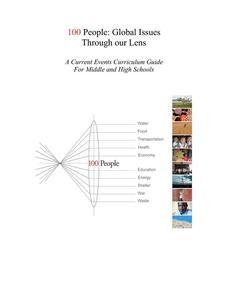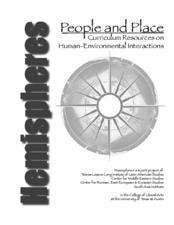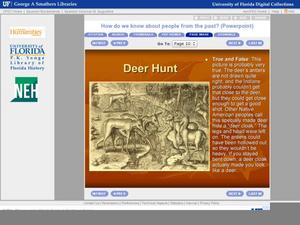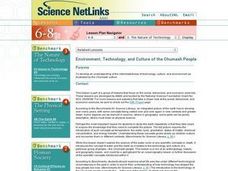Curated OER
Ordinary People: Anticipation Guide
Activate your pupils' thinking before reading chapter five of Ordinary People. Learners decide whether they agree or disagree with six statements and discuss their ideas in small groups. They then read chapter five and determine if a...
Museum of the American Revolution
People of the Revolution
It's nothing new—America has always been a melting pot of cultures. The resource explores the diversity of individuals living in the American colonies during the Revolutionary War. Scholars examine artifacts and primary sources to...
National Woman's History Museum
Stacey Abrams: Changing the Trajectory of Protecting People’s Voices and Votes
In this project-based learning lesson, young social scientists investigate Stacey Abrams' campaign to protect the voting rights of people across the nation. Investigators learn how to annotate assigned articles, watch videos, and collect...
C-SPAN
1968: The Poor People's Campaign
The Poor People's Campaign of 1968 marked a shift in the civil rights movement to economic issues. Speakers in four C-SPAN video clips discuss different aspects of the campaign including Resurrection City, the Economic Bill of Rights,...
Spark Notes
Ordinary People by Judith Guest: Study Guide - Mini Essays
In this online interactive literature worksheet, students respond to 10 short answer and essay questions about Judith Guest's Ordinary People. Students may check some of their answers online.
Curated OER
How Often Do You Interact with People of Another Race or Ethnicity?
Is interacting with people from different backgrounds part of a well-rounded education? A big question awaits young readers as they explore two New York Times articles that discuss modern-day segregation, population statistics, and...
100 People Foundation
100 People: Global Issues Through Our Lens
If the world were 100 people...17 would not have access to safe drinking water, 18 would not be able to read or write, and 52 would not have a primary education. Using the theme of "100 people," this resource explores other major issues...
Curated OER
Influential People Taking A Stand
Seventh graders explore how influential people have taken a stand on difficult issues and the consequences that followed. This lesson connect American studens with students in England who present their own person for exploration.
Curated OER
Important Arkansas People
Famous people in the history of Arkansas are the focus of a history lesson plan for kindergartners. Pupils identify important Arkansas citizens, such as President Bill Clinton. They create an illustrated poem that features some of the...
Curated OER
Hemispheres: People and Place
Here is an astounding series of lessons, designed for high schoolers, on environmental policy. By studying water conservation in rural India, the role of the government, and the reaction of the people, learners begin to formulate...
Curated OER
The Twelve Core Values of the Inupiaq People - How do they fit in your life?
Students become familiar with the Inupiaq culture. In this Inupiaq lesson, students listen to read alouds about the life style of the Inupiaq in Alaska, Students understand the twelve core values of the Inupiaq people. Students choose a...
Curated OER
How Do We Know About People From The Past?
It's not enough to see or just read a primary source document; one has to analyze them fully to understand their historical implications. First learners are introduced to what primary and secondary sources are, then they read a bit of...
Curated OER
Comparison and Contrast: Neat People vs. Sloppy People and Batting Clean-up and Striking Out
After your class reads Neat People vs. Sloppy People and Batting Clean-up and Striking Out, provide them with this resource. Use it as a quiz or a homework assignment to assess your class's understanding of the author's purpose, the...
Curated OER
Developing Relationships with Older People
Students read books and view movies about older people. They write a questionnaire to interview older people at a retirement center, interview the people, record their information on graphs, and write follow-up letters.
Curated OER
World History People Review
Who's who in World History? Help your historians keep track of major figures with this World History People Review, where students match 96 world figures to the appropriate descriptions. The matching questions are grouped by historical...
Curated OER
Famous People in History
This is an introduction intended for grades 6-8 that focuses on famous people. It begins by asking learners to think about what makes a person famous. It shows various individuals in recent decades that have been considered famous, then...
Alcohol Education Trust
Talk About Alcohol: Why Are Young People Advised Not to Drink?
What should young people think about before drinking alcohol? Have your class consider the eight reasons listed here, some of which are facts, and others opinions. Pupils rank each statement from one to eight, where one is the most...
Curated OER
Negative Space People
Learning about negative space can help kids see things in a whole new way. They use negative space and bright, primary colors to create an image of people in action. Each of the four squares will contain a single negative-space person...
ESL Kid Stuff
Describing People (Adjectives)
As part of a series of lessons focusing on the parts of speech, language learners engage in games and exercises that encourage them to use adjectives to describe people.
Curated OER
Environment, Technology, and Culture of the Chumash People
Students develop an understanding of the interrelatedness of technology, culture, and environment as illustrated by the Chumash culture. They research the tribe and complete a table for the Chumash people describing their environment,...
Curated OER
Why do we remember people?
How do some people get put into history books, and why are they remembered? Younger kids review a series of people who have been remembered throughout history for the things they did. Whether infamous or simply famous, these historical...
Curated OER
Describing People
With a variety of pictures, fourth grade Spanish language learners will review adjectives by describing the appearance of the people in the pictures. You will need to bring in the pictures, and consider creating a word bank of adjectives...
National Endowment for the Humanities
People and Places in the North and South
North and South: two opposite directions and two opposite economic and social systems in time of the Civil War. Pupils peruse census websites and primary source photographs to understand what life was like for the everyday person before...
Curated OER
Create a Magic Lantern Show; Freed People in the Reconstruction South
Engage your scholars by having them create "magic lantern shows" inspired by the film Dr. Toer's Amazing Magic Lantern Show: A Different View of Emancipation. As they study the South's Reconstruction through primary sources, learners...
Other popular searches
- Famous People
- Famous People in History
- People and Society
- Native American Peoples
- People With Disabilities
- Five People You Meet in Heaven
- Famous People Sports
- Famous People Report Outline
- Famous People From Peru
- Indigenous People
- People Who Help Us
- Famous People in Canada

























